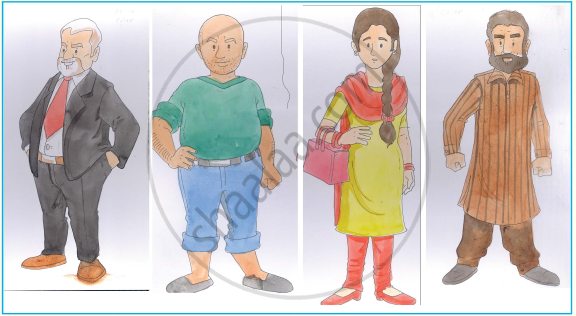Advertisements
Advertisements
Question
So after that, dimly, dimly, she sensed it, she was different and they knew her difference and kept away. There was talk that her father and mother were taking her back to Earth next year; it seemed vital to her that they do so, though it would mean the loss of thousands of dollars to her family. And so, the children hated her for all these reasons of big and little consequence. They hated her pale snow face, her waiting silence, her thinness, and her possible future. “Get away 1” The boy gave her another push. “What’re you waiting for?”Then, for the first time, she turned and looked at him. And what she was waiting for was in her eyes. “Well, don’t wait around here !” cried the boy savagely. “You won’t see nothing!” Her lips moved. “Nothing 1” he cried. “It was all a joke, wasn’t it?” He turned to the other children. “Nothing’s happening today. Is it ?”
Read the extract given below and answer the question that follow.
What was Margot waiting for? Why did William say it was a joke?
Solution
Margot was waiting to see the sun predicted to shine that day for a short while. William did not want her to have the joy of seeing the sun .
APPEARS IN
RELATED QUESTIONS
Thinking about the Text
Answer these question.
At last a sympathetic audience.”
(i) Who says this?
(ii) Why does he say it?
(iii) Is he sarcastic or serious?
How does he narrate the story of the tusker? Does it appear to be plausible?
We notice lots of details about people and their appearance, but in order to
vividly describe them , we need to be specific.
Working in pairs, look carefully at the people around you and complete the
table with appropriate words from the box given on the next page. You may
add words of your own to describe people.

| angular | close-cropped | well-tailored | well-tailored casual | stocky |
| elegant | unshaven | ill-fitting | formal | lanky |
| bearded | sloppy | medium | petite | hefty |
| balding | slim | plaited | thick | round |
| open | friendly | wavy | long | receding |
| over weight | sharp-featured |
| A | B | C | D | |
| Face | ||||
| Hair | ||||
| Dress | ||||
| Build |
Exceeding peace had made Ben Adhem bold,
And to the presence in the room he said,
"What writest thou?"..... The vision raised its head,
And with a look made of all sweet accord,
Answered, "The names of those who love the Lord."
Read the lines given above and answer the following question.
Why was Abou not afraid?
Of the seven hundred villages dotting the map of India, in which the majority of India’s five hundred million live, flourish and die, Kritam was probably the tiniest, indicated on the district survey map by a microscopic dot, the map being meant more for the revenue official out to collect tax than for the guidance of the motorist, who in any case could not hope to reach it since it sprawled far from the highway at the end of a rough track furrowed up by the iron-hooped wheels of bullock carts. But its size did not prevent its giving itself the grandiose name Kritam, which meant in Tamil coronet or crown on the brow of the subcontinent. The village consisted of fewer than thirty houses, only one of them built from brick and cement and painted a brilliant yellow and blue all over with
gorgeous carvings of gods and gargoyles on its balustrade, it was known as the Big House. The other houses, distributed in four streets, were generally of bamboo thatch, straw, mud and other unspecified material. Muni’s was the last house in the fourth street, beyond which stretched the fields. In his prosperous days Muni had owned a flock of sheep and goats and sallied forth every morning driving the flock to the highway a couple of miles away.
Read the extract given below and answer the question that follow.
Name the village in which Muni lived.
Read the extract given below and answer the questions that follow:
'Tell me not in mournful numbers,
Life is but an empty dream!
For the soul is dead that slumbers,
And things are not what they seem.'
(A Psalm of Life-H. W. Longfellow)
(i) Explain-'Tell me not in mournful numbers, Life is but an empty dream!' What should not be considered the goal of life?
(ii) What is the beating of the heart compared to? How is the heart described? IV/wt does the beating of the heart remind us of?
(iii) What does the poet mean when lie compares the world to a battlefield? What should our role be in this battle?
(iv) How should we view the past and the future? what advice does the past give in this context?
(v) What do we learn from the lives of great men? What is the final message of the poem ? Give one reason why the poem appeals to you.
Why did Gopal’s wife find his activities strange?
What do you know about the Viking Mission to Mars?
What assurance did the sunrays give to Saeeda?
What does he carry in his hand?
